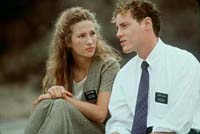

Interested in learning more about the Church of Jesus Christ and Latter Day Saints? God's Army may not be the movie for you. God's Army is an independent movie by Richard Dutcher; one made from a Mormon point of view. This is interesting, since a Mormon perspective is not usually heard in the film world. The only Mormon-related movies in recent memory are Orgazmo by Trey Parker (the co-creator of South Park which should tell you about the level of the movie) and Your Friends and Neighbors and In the Company of Men, two films by Neil Labute, a Mormon filmmaker who's films would probably horrify members of the LDS church. Instead, God's Army is made along the same lines as The Omega Code, the hokey action movie from TBN. It is a film from a demographic segment not quite film-savvy, and regardless of the final quality, will have a built in audience trumpeting its greatness. Dutcher's challenge is to make a film true to his beliefs that both Mormons and non-Mormons will be able to appreciate. He succeeds partially.
The main problem is that Dutcher uses conventional storytelling and tired cliches to push the story forward, ignoring far more interesting parts of his narrative. God's Army follows Elder Allen (Matthew Brown), a Kansas native beginning his mission in Los Angeles. Allen is dealing with problems in his family, and is unsure of his desire to complete the mission. The church pairs him with Elder Dalton (Dutcher), a twenty-nine year old also on a mission. Dalton is a caring but stern companion. The movie follows them as they interact with other missionaries, and try to preach to people in their ward. The first disappointment is with Brown's character. His doubts overwhelm him so completely that he tries to go home his first night in Los Angeles. Why does he decide to stay? Dalton sure did not seem convincing. Any internal struggle is kept quiet, and the power is lost upon the audience.
The other missionaries living with Dalton and Brown and infinitely more interesting, and their stories are also shortchanged. Elder Banks (DeSean Terry) is a black Mormon, who did not know of many church's former policies until after his conversion. He speaks about his frustration for a few minutes, then his little story is over. The same happens with Elder Kinegar (Michael Buster, Drop Dead Gorgeous), a Mormon who reads anti-Mormon books. He claims he is reading them to strengthen his own belief, by making sure he can debunk their allegations. Terry and Buster also give the best performances in the film. The other missionaries do not like this, and usually shout him down rather than trying to argue out their beliefs. Dutcher instead focuses on other, more superficial stories. The last third of the movie descends into cheesiness, with an especially melodramatic ending.
A lot will be lost on non-Mormons. Dutcher does not explain much, he just displays them on screen. He does deserve credit for toning down any preaching towards the audience; any such inclusion would turn away all non-Mormon audiences. However, some sort of history or introduction would be nice. The dialogue is interesting and well written, but the characters lack real depth. They have many opportunities to talk about their religion and how it affects them, but any such treatment is short and lacking. By the end of God's Army, all of the characters moved forward along their spiritual paths, but it is not believable. They each have their five to ten minutes in front of the camera, then the story moves on to someone else.
It is also obvious that Dutcher's filmmaking ability could also improve, and undoubtedly will with future films. His relative inexperience shows with some of the shots and camera angles at various points in the film. He is also a better director and writer than actor; most of his delivery is atonal. Elder Allen seems unsure of what to say or do most of the time, as does Brown, so his acting unintentionally succeeds. The most notable thing about God's Army is how utterly conventional it is when compared to normal films. It is much better than The Omega Code, but lacks the discernment of a film like Dogma.